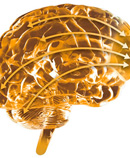
|
|
The brain can change: The unique role of Maharishi's Transcendental Meditation 'Your brain did not come fully assembled at birth,' says Dr Fred Travis, director of the EEG/Psychophysiology Center at Maharishi University of Management in Fairfield, Iowa, USA. 'Through the natural processes of maturation and experience, your brain is being created anew at every moment to support all of your thinking, deciding, and behavior. The ongoing creation—and re-creation—of your brain is a dynamic process.' He explains the essential role of student years—it is critical 'because that is when you can gain the key experiences that will develop your brain in a healthy manner. Education should culture integrated brain functioning so that you make better decisions, evaluate situations more accurately, and enjoy more of life throughout your life.' 'Integrated brain functioning' When asked if the whole brain is involved in decision-making, Dr Travis refers to the significant orchestrating role of the frontal lobes. 'The part of the brain that is most critical for evaluating all the information is called the frontal lobes or association cortex. This part of the brain doesn't get any direct information from outside—it puts together what the senses have brought in through hearing, seeing, touch, etc. The frontal lobes are like a conductor who takes the talent from different sections of the orchestra and puts them all together into a whole piece of music.' Dr Travis points out that stressful experiences, including drug and alcohol abuse, being raised in a broken home, fear of crime or violence, and 'even a bad diet', affect frontal lobe development. 'And when a person's frontal lobes don't develop, he lives a primitive life. He can't—and doesn't—plan ahead. His world is simplistic, and he can only deal with what's happening to him right now. That's where the rigid thinking comes in: "You're either with me or against me. . . ." Luckily, the brain can change—the unique role of Maharishi's Transcendental Meditation Such as? 'Such as Transcendental Meditation.' 'Within two or three months of Transcendental Meditation practice, we begin to see high levels of integration of frontal brain connectivity. And interestingly, that integration does not disappear after Transcendental Meditation practice—increasingly and over time, that orderly brain functioning is brought into daily activity. Research shows that in those who have been meditating for many years—an average of 24 years—inner wakefulness and brain integration are maintained all the time, 24/7. And, in truth, this should be the purpose of education. Education should not just be about learning multiplication or periodic tables. It should culture integrated brain functioning as well so that you make better decisions, evaluate situations more accurately, and enjoy more of life throughout your life.' The importance of student years in becoming a 'master of life' 'Then,' he continues, revealing the most exalted benefits of the practice, 'when a student finishes his education at age 25 with a master's or a PhD, he will be not only a master in one specific area of life but a master of life itself. Right thinking will arise from the deepest, most fundamental level of life. Then spontaneously, actions will be right—in tune with the environment and the people around him. This is the state of enlightenment—and this is the vision of possibilities open to any student, no matter his age, religion, or nationality, when Transcendental Meditation is part of the school's curriculum.' Editor's note: The content and quotations used in this article are from the Abramson Family Foundation web site. The Abramson Family Foundation provides funding for research on Transcendental Meditation and makes scholarships available for students to learn the technique. © Copyright 2009 Global Good News®
|
|

